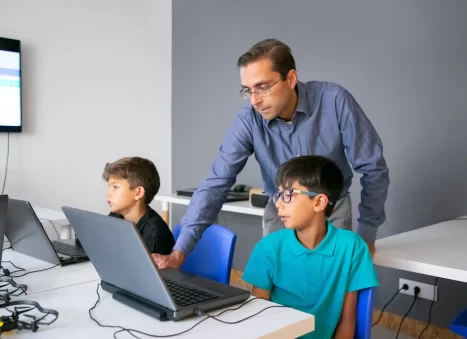
The Road to Emotional Regulation: How to Help Kids Manage Big Emotions
Emotional regulation refers to the ability to manage and respond appropriately to emotions. It’s a critical skill for children’s development and well-being that allows them to cope with normal but strong feelings like anger, sadness, and anxiety.
Without this ability, children may act out in disruptive ways or become overwhelmed. Some children struggle more than others with emotional regulation due to factors like inborn temperament, their environment and life experiences, and conditions like ADHD, anxiety, or autism spectrum disorder.
Helping kids develop emotional regulation skills early on can set them up for success in life, improving their relationships, academic performance, and overall mental health. It’s an important aspect of their emotional intelligence.
In this article, we’ll explore how to recognize and manage children’s emotions, providing an in-depth overview of child emotional regulation. We aim to offer accessible, practical information to help parents effectively support and understand their children’s emotional journeys.
Why Emotional Regulation is Difficult for Children?

Children have limited life experiences, so they often interpret situations in black-and-white terms, leading to stronger positive or negative emotions. Their brains are not completely developed to understand every emotion and regulate it in a better way. This is what causes frequent outbursts.
They start throwing tantrums and find it difficult to manage their feelings. Moreover, their temperament influences their emotional response and the environment where they are growing up.
Some children are more sensitive and intense by nature, whereas others struggle because of their home environment, which is often chaotic and stressful. However, you should remember that being unable to regulate emotions is not a result of poor parenting. It is a normal part of their development, which needs constant support and guidance.
Signs of Emotional Dysregulation in Children

When children struggle with emotional regulation, the impact can be significant. Common signs include severe, frequent tantrums or unusually long-lasting outbursts. They may refuse to engage, shut down completely, or show a low frustration tolerance.
Persistent negative moods like irritability, anger, or sadness can indicate difficulty managing emotions. Some dysregulated children act out aggressively by hitting, biting, or destroying property.
Some of the other signs are difficulty in making friends, as well as being friends with people. This happens because of their volatile emotions, disruptions in their classroom, and frequent meltdowns, which hinder their routines like bedtime mealtimes and difficulty in handling minor setbacks and disappointments.
These behaviors interfere with the daily functioning of the child, as it becomes difficult for them to concentrate in school, learn and complete daily tasks, and develop healthy relationships with their family and friends. Noticing these signs is the first step towards helping your children overcome these challenges and develop better skills.
Strategies to Help Children Regulate Emotions

It’s never too early to start teaching emotional regulation skills. Begin labeling and discussing emotions early on when children are very young and reinforce the lessons as they grow up. Model good emotional regulation yourself by handling frustrations calmly and narrating your thought process for dealing with big feelings appropriately.
It’s important to make education age-appropriate in any form. For young children, this might mean using playtime or activities they already enjoy as teaching moments.
Use role-playing with dolls or puppets, read stories about characters experiencing emotions, and engage kids in hands-on activities. This will help them practice identifying emotions in themselves and others.
Moreover, there’s a nuanced understanding of what triggers certain feelings and learning regulation strategies like deep breathing or taking a break.
Understand children’s emotions as normal and manageable while providing a safe, judgment-free environment to express themselves openly.
Teach specific coping skills like belly breathing, going to a quiet, calm-down corner, artwork, journaling, and positive self-talk. Be sure to praise and reinforce any instances of good emotional management.
As children get older, you can use more mature tactics and include more serious conversations in your teaching methods. Every child will be different, and you know your kids better than anyone, so use your judgment to decide when and how to teach them about emotional regulation.
The Importance of Nurturing and Lifestyle Factors

While teaching emotional skills directly is crucial, as a parent, you can shape your child’s emotional regulation through nurturing lifestyle factors. Healthy sleep habits like a consistent, age-appropriate sleep schedule and calming bedtime routine can help kids feel rested and better able to cope with big feelings that arise.
A balanced diet focused on nutritious whole foods gives their growing brains and bodies the fuel needed to self-regulate. Plenty of physical activity and outdoor play allow kids to release excess energy and healthily manage stress.
Other beneficial lifestyle habits include family bonding time, limited screen exposure, and teaching relaxation practices like gentle yoga.
It’s in your hands to create a peaceful, predictable home environment with clear routines and limits. This will provide a stable foundation for kids to feel safe and secure as they learn to navigate emotions.
When children’s basic needs are met, they’re better equipped to handle the inevitable emotional ups and downs of life.
Seek Support From Experienced Professionals

If, despite your efforts, emotional dysregulation in your child persists for an extended period and significantly interferes with their functioning or development or presents a safety risk, it may be time to seek professional support.
A practitioner with a post-professional Occupational Therapy Doctorate has advanced training in emotional regulation interventions and can provide valuable assessment, individualized strategies, and hands-on guidance.
Child psychologists, counselors, therapists, and other mental health professionals can also offer formal assessments to identify any underlying conditions. It also provides evidence-based therapies tailored to your child’s needs, such as cognitive behavioral therapy, play therapy, or mindfulness practices.
Working with the right professional allows you to get to the root of any emotional struggles and access expert advice. There’s no shame in asking for help as a parent — we all need it in one way or another.
Helping children develop emotional regulation skills is a journey that requires patience, consistency, and a nurturing approach. By understanding the challenges, recognizing the signs of dysregulation, and implementing effective strategies, parents can guide their children toward healthier emotional understanding and management.
Seeking professional support is a strength, not a weakness – it’s an investment in your child’s emotional well-being. With the right tools and support, every child can learn to navigate the ups and downs of emotions with confidence and resilience.
So, take a deep breath, and ask yourself: what’s the one thing you can do today to help your child better manage their big emotions?
Read More:
Already have an account?
Sign In
Create your account
User added successfully. Log in








